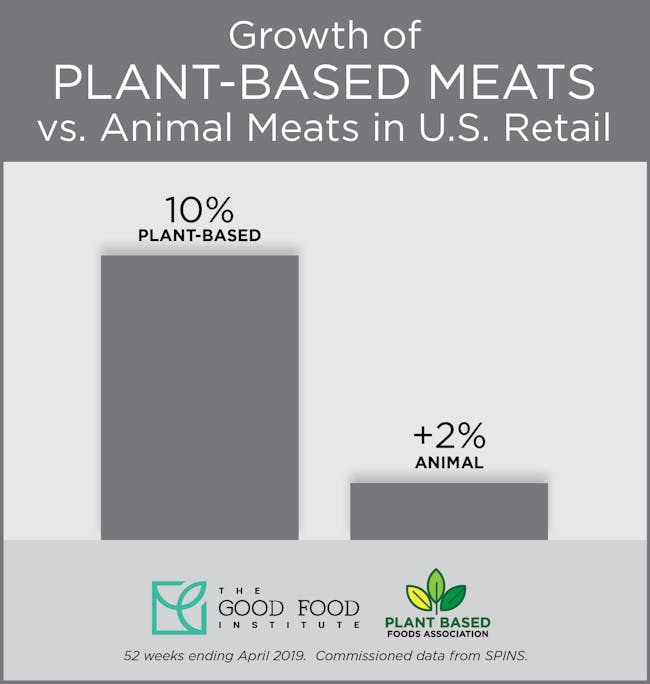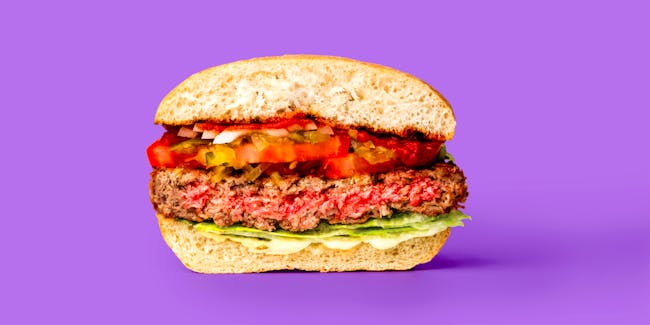“It’s a real change in consumer behavior.”
Plant-based meat is on the move: A report released recently shows that retail sales across the industry are growing even faster than regular meat.
The emergent food trend of plant-based alternatives to animal products, exemplified by the likes of Impossible Burger and Beyond Meat products, has grown five times faster than the food industry as a whole, the report finds.
“This is not a bubble or a fad,” Caroline Bushnell, associate director for the Good Food Institute, a non-profit think tank that lobbies for plant-based meat alternatives and which wrote the report, tells Inverse. “It’s a real change in consumer behavior.”
The American retail report highlights the rapid growth of a product that’s already made its way into the likes of Burger King, the meat-centric fast food chain that started selling the Impossible Whopper in April. On the whole, the industry grew to reach $4.5 billion. Plant-based meat is now worth $800 million, and accounts for two percent of packaged meat sales.
Across several categories, plant-based alternatives are growing at a faster pace than animal-sourced products. In the case of meat, the vegetarian alternative is growing five times faster:

In the case of yogurt, plant-based alternatives have left dairy far behind:

Other areas saw similarly dramatic jumps. Sales for plant-based milk grew six percent to claim 13 percent of the whole industry, while traditional dairy sales shrunk three percent. Dairy cheese flatlined in growth, as its plant-based brother soared ahead and grew 19 percent. Plant-based ice cream and other frozen novelties grew 27 percent, while conventional products grew just one percent. In total, all food sales grew two percent, but plant-based food in particular jumped 11 percent.
See also: “The War on Soy”
The sudden surge has led experts to declare that the products have reached a tipping point, urging retailers to offer more space for these products.
“Plant-based foods are a growth engine, significantly outpacing overall grocery sales,” Julie Emmett, a senior director for the Plant Based Foods Association that worked with the GFI [Good Food Institute] on the report, says in a statement. “We are now at the tipping point with the rapid expansion of plant-based foods across the entire store, so it is critical for retailers to continue to respond to this demand by offering more variety and maximizing shelf space to further grow total store sales.”
There are already signs that retailers plan to further make way for fake burgers. In Sweden, Burger King rolled out the 50/50 menu earlier this month, where buyers receive a random choice and use an app to guess whether the burger is plant-based or meat. The answer is revealed by scanning the box with the app:

The Taste for Fake Meat Reaches a Tipping Point
But why now? After all, veggie burgers have been around for years. In fact, plant-based alternatives to meat and dairy have shown a steady uptick all the way back to 2000. Beyond Meat was founded a decade ago in 2009 and Impossible Foods in 2011. Bushnell credits the innovation from firms like Beyond and Impossible — explicitly focused on identifying the roots of burger tastiness and recreating it using plants — with kickstarting a faster shift.
“These companies are breaking down meat into its component parts — proteins, fats, water, etc. — and recreating each component from a plant source,” Bushnell explains. “They are effectively revolutionizing the idea of what meat is. Instead of cycling plants through animals to transform them into meat, why not make meat directly from plants?”
Other reports about the industry echo similar predictions. A report last month from AT Kearney estimated that vegan meat will account for 25 percent of the market by 2040, with conventional meat at 40 percent. The final 35 percent will come from lab-grown meat, an innovation set to hit shelves as early as 2021.
“We’ll still have meat, but it will be made directly from plants or grown from cells, instead of from slaughtered animals,” Bushnell says. “Growing meat from animals is simply inefficient, and it will be replaced by these better and more sustainable methods that deliver on the key driver of consumer choice: taste.”
Impossible Foods is now targeting expansion into Asia, which consumes nearly half the world’s meat. Beyond Meat’s chief financial officer also declared in the June earnings call that there is a “desperate” need for the product in Asia. As business soars stateside, plant-based meat’s biggest days of growth may be still to come.
“Shifting consumer values have created a favorable market for plant-based meat, and those values are best exemplified by the Millennial and Gen Z generations, whose purchasing power and influence will only continue to grow,” Bushnell says. “This is really only the beginning.”
(For the source of this, and many other quite-interesting articles, please visit: https://www.inverse.com/article/57678-plant-based-meat-reaches-tipping-point-as-growth-outstrips-regular-meat/)









